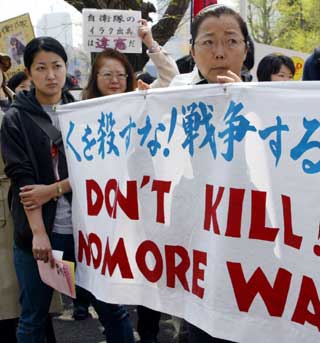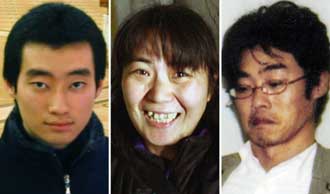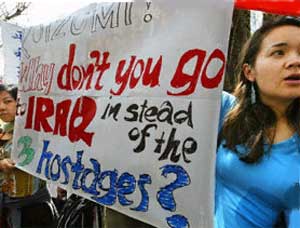|
Koizumi in pinch over Iraq hostage crisis
(Agencies)
Updated: 2004-04-09 14:09
Facing his toughest political test, Japanese Prime Minister Junichiro Koizumi
told an anguished Japan on Friday he had no plans to pull troops from Iraq
despite threats to kill three Japanese civilians kidnapped by insurgents there.

Demonstrators
holding a banner call for the withdrawal of Japanese forces from Iraq in
front of the Lower House of the parliament in Tokyo April 9,
2004.[Reuters] | Tearful families of the hostages
pleaded for the government to rescue their loved ones, and the mother of
18-year-old Noriaki Imai urged to the government to withdraw the troops.
Calls for withdrawal of Japan's non-combat troops are growing and some
analysts said mishandling of the crisis could even bring down the government, a
prospect that worried financial markets.
Japanese were stunned when a previously unknown Iraqi group released a video
late on Thursday showing the three hostages, including one woman, blindfolded
and with a gun to their heads.
The group vowed to "burn them alive" if Japanese troops did not leave Iraq
within three days.
"I want to ask for the troops to be quickly withdrawn so my son and the
others will come back to us safely," Naoko Imai told reporters before visiting
the foreign ministry.
Koizumi, however, told a news conference he was not considering withdrawing
troops from Samawa, in southern Iraq, where 550 Japanese soldiers are stationed.
"We should not give in to these despicable threats from terrorists," Koizumi
said. He added that the most important thing was to ensure the safety of the
hostages.
The whereabouts of the three -- Imai, who had planned to look into the
effects of depleted uranium weapons; aid worker Nahoko Takato, 34; and freelance
reporter Soichiro Koriyama, 32 -- was unclear.

From left to right,
Noriaki Imai, 18, Nahoko Takato, 34, and Soichiro Koriyama, 32.
[Reuters] | So was the precise deadline, although
one ruling coalition official said it was around 9:00 p.m. (1200 GMT) on April
11.
Besides the Japanese, seven South Koreans and a Briton were among those
reported taken hostage. The Koreans were later freed.
Vice President Dick Cheney, who arrives in Tokyo on Saturday at the beginning
of an Asian tour, is expected to urge Washington's allies in the region to stand
firm in their commitment to the U.S.-led mission in Iraq.
No Japanese soldier has been killed in combat since 1945, and casualties
could affect support for Koizumi's government, whose ruling coalition faces
Upper House elections in July.
HORNS OF DILEMMA
Japan's opposition was quick to blame Koizumi and urged an end to Japan's
riskiest military mission since World War II.
Some 100 protesters gathered near parliament, demanding an end to the Samawa
mission. Buddhist monks in yellow robes banged hand-drums next to sign saying
"Don't Kill! No More War."

Japan's public is sharply divided over the dispatch. Critics say it violates
Japan's pacifist constitution and resent what they saw as U.S. pressure to put
"boots on the ground" in Iraq.
"As we've said in the past, hasn't this Iraq war contributed to an expansion
of terrorism, rather than leading to its prevention?," Democratic Party leader
Naoto Kan told parliament.
Supporters of the deployment have said it is time for Japan to shoulder more
responsibility for global security.
"I think it's a very difficult decision, but I don't think they should pull
out the troops," said Mieko Sakai, 43, who runs a job agency. "The question is,
then, how to protect lives."
Tokyo residents are worried about a possible attack in the nation's capital,
while in Samawa, blasts were reported again on Thursday near the Japanese
soldiers' camp.
There were no reports of casualties or damage but the troops have suspended
their reconstruction work outside the camp.
Financial markets were also on edge.
"The event made investors very nervous," said Yasuo Ueki, a market analyst at
consultancy Poko Financial Office.
"Market players are now looking at how public opinion will be formed... and
if the government mishandles the issue, that could bring down the Koizumi
cabinet."
The Nikkei share average was down 1.64 percent at 11,894.63 about an hour
before the close and the yen was trading at about 106.44 to the dollar after
falling as low as 106.78.
Bond prices rose slightly and the yield on the 10-year government bond was
down 1.5 basis point at 1.475 percent.
| |
 |
|
 |
|
|
Today's
Top News |
|
|
|
Top World
News |
 |
|
 |
|
|
|
|
|
|


